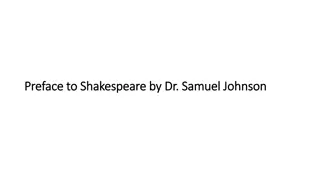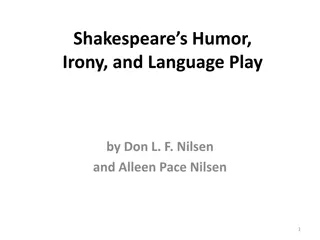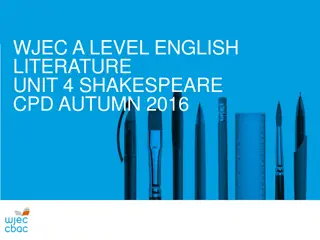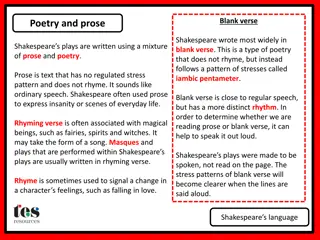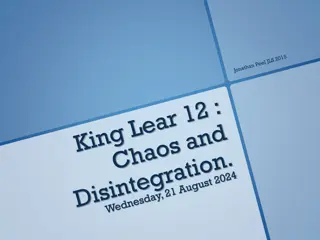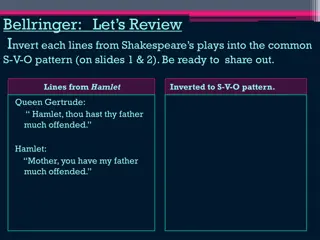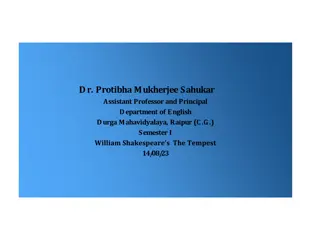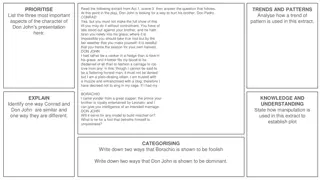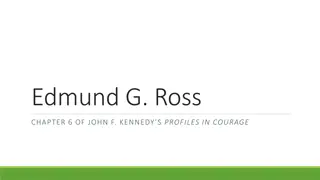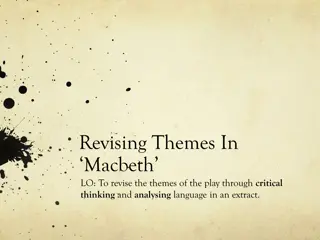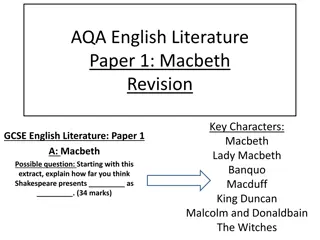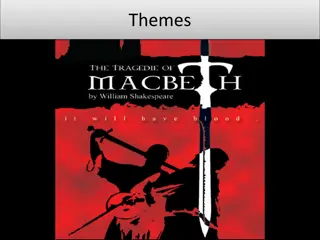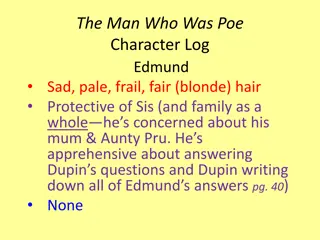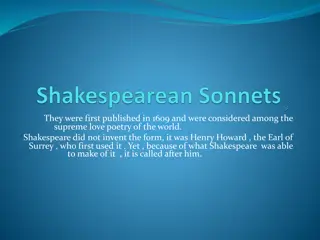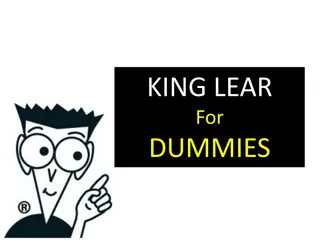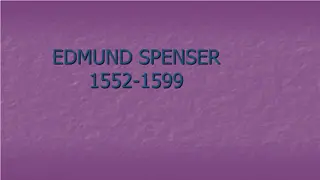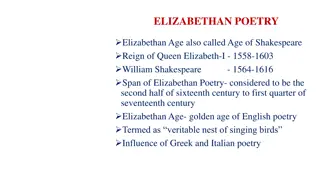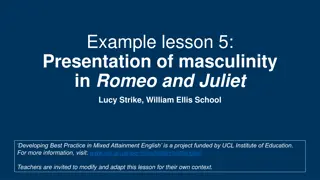Analyzing Edmund and Lear in Shakespeare's King Lear
In Shakespeare's play King Lear, this analysis delves into the characters of Edmund and Lear. The first prompt examines Edmund's sentiments on legitimacy and family relations, while the second discusses Lear's commentary on women's insufficiencies. The use of literary devices, such as diction, imagery, and figurative language, enhances the understanding of the characters' emotions and beliefs.
Download Presentation

Please find below an Image/Link to download the presentation.
The content on the website is provided AS IS for your information and personal use only. It may not be sold, licensed, or shared on other websites without obtaining consent from the author.If you encounter any issues during the download, it is possible that the publisher has removed the file from their server.
You are allowed to download the files provided on this website for personal or commercial use, subject to the condition that they are used lawfully. All files are the property of their respective owners.
The content on the website is provided AS IS for your information and personal use only. It may not be sold, licensed, or shared on other websites without obtaining consent from the author.
E N D
Presentation Transcript
Turn in your Line By Line activity for Act IV to the white plastic bin.
In the following passage from King Lear (Act I, scene ii), Edmund openly expresses his feelings toward his father, his brother, and his situation. Read the passage carefully, and then write a well- organized essay in which you analyze Edmund s character and evaluate his sentiments with regard to notions of natural family relations and the problem of legitimacy versus illegitimacy. What is this prompt asking?
The following speech comes from Shakespeares King Lear, Act IV, scene vi. In a state of anger and confusion, Lear is desperately trying to deal with his disillusionment over the neglect and disrespect he has experienced at the hands of his daughters Regan and Goneril. Upon meeting Gloucester in Dover, Lear is able to recognize that Gloucester, too, has experienced a similar fate because of his contentious sons. Carefully study the following passage and write a well-organized essay in which you analyze how Lear s commentary extends into a tirade on the insufficiencies and dangers of women. What is the prompt asking?
KING LEAR 1. Discuss Lear s Commentary (what is he SAYING?) Connect to how he extends to the INSUFFICIENCIES and DANGERS of women? Example thesis format: In Lear s dramatic monologue, his commentary reveals/ conveys the view that_________________________________________. 2. 3. The prompt expects a connection to THEME
Should I talk about Literary Devices? D I D L S Diction (specific word choice, connotations) Imagery (descriptions that appeal to the senses) Details Figurative Language (similes, metaphors, personification, allusions, etc.) Syntax (patterns in sentence structure)
INEFFECTIVE: EFFECTIVE: Edmund metaphorically compares societal customs to a plague in order to show his great distain for a culture that labels him insufficient. Shakespeare uses imagery to Shakespeare uses irony to Edmund describes his conception as taking place in the lusty stealth of nature, which gives him a fierce quality (11-12); by contrast, his brother was conceived in a dull, stale, tired bed (14). The contrasting imagery suggests that Edmund is filled with the same passion and fire that his parents felt when they conceived him while his brother is as boring and dull as his parents marriage bed. The use of rhetorical questions serves to which is a metaphor
Methods Meaning Diction, Imagery, Details, Figurative Language, Syntax Tone Theme Effect Purpose
1. Identify the device (unusual diction, syntactical structure, image, figurative language) and provide the context in which it appears in the text. 2. Connect the device to the meaning of the passage being analyzed. Avoid generic commentary. Provide an original insight. Precise and purposeful diction enhances analysis. 3. Example: The phrase, a thin beard of ivy, used to describe Gatsby s mansion conveys a sense of_________________________.
Introduction (Hook-Bridge-Thesis) Body Paragraphs Topic Sentence (subtopic related to thesis) CHUNKS = Context + Textual Evidence + Commentary Textual evidence should be effectively embedded Commentary should be meaningful (ratio of 2:1) Should have more than one chunk Summary Sentence (connect to thesis, transition) Conclusion (connect to THEME)
Idea or Subtopic Nuances in the monologue Key points/ideas worth analyzing Chronological Beginning-Middle-End of monologue INEFFECTIVE This prompt (nor any literary analysis prompt) does not warrant a focus on DEVICE ORG. BY DEVICE
Skills for Embedding Text: Paraphrasing: Put the context in your own words. After George kills Lennie, Slim tells him he did the right thing (Steinbeck 106-07).
Skills for Embedding Text: Paraphrasing with Text Evidence: You can include both paraphrase and quotations together for more effective embedding. After George kills Lennie, Slim comes directly to George and says, A guy s got to sometimes as they leave the river s edge, suggesting that Slim thinks George did the right thing (Steinbeck 107).
Skills for Embedding Text: Brackets:Alter a quote for clarity by placing the change in brackets. Original: George said, That mouse ain tfresh, Lennie; and besides, you ve broken it pettin it (Steinbeck 39). With Brackets: Steinbeck foreshadows Lennie s troubles early in the novel when Lennie has broken [the mouse] pettin it (Steinbeck 39).
Skills for Embedding Text: Ellipsis: Omit unnecessary detail in order to be concise by using three periods (called an ellipsis). You do not need ellipsis at the beginning and end of your quotations. Original: Curley was white and shrunken by now, and his struggling hand had become weak. He stood crying, his fist lost in Lennie s paw (Steinbeck 68). With Ellipsis: As Lennie continued to crush Curley s fist, he turned white and shrunken his fist lost in Lennie s paw (Steinbeck 68).
Skills for Embedding Text: INEFFECTIVE: Overusing quotations (two quotes in a row). Example: Lennie s strength overpowered Curley. The next minute Curley was flopping like a fish on a line, and his closed fist was lost in Lennie s big hand. Curley was white and shrunken by now, and his struggle had become weak. He stood crying, his fist lost in Lenny s paw (Steinbeck 68). Revised: Lennie s strength so overpowered Curley that Curley looked like a fish on a line with his fist lost in Lennie s paw (Steinbeck 68).
Skills for Embedding Text: INEFFECTIVE: Identifying a speaker without context. Example: Macbeth desperately asks, Will all great Neptune s ocean wash this blood clean from my hands? (II.ii.59-60). Revised: After the murder of the king, as Macbeth experiences the initial pangs of guilt, he desperately asks if all great Neptune s ocean could wash this blood clean from [his] hands (II.ii.59-60).
Skills for Embedding Text: INEFFECTIVE: Disconnected context and text evidence. Example: When Paul is leaving the bedside of his dying friend, he is unusually aware of his surroundings. This is shown in the quote, the earth is streaming with forces which pour into me through the soles of my feet (Remarque 33). Revised: Because his emotions are swirling as a result of leaving the bedside of his dying friend, Paul experiences the earth streaming with forces which pour into [him] through the soles of his feet (Remarque 33).
Skills for Embedding Text: INEFFECTIVE: Placing the quote before the context. Example: Ferocious beasts of the forest who lie in wait for their prey shows how Frederick Douglass thinks the people are cruel and animal-like. Revised: Because Frederick Douglass metaphorically compares white men to ferocious beasts of the forest who lie in wait for their prey, he substantiates his feeling of paranoia as he escaped slavery and attempted to blend in to society (Douglass 23).
Skills for Embedding Text: INEFFECTIVE: Empty or meaningless analysis. Example: The quotation Some things about living still weren t quite right, though. April, for instance, still drove people crazy by not being springtime supports this idea. Revised: The implication of April not being springtime supports Vonnegut s assertion that trying to control and equalize humanity would cause disarray not only among mankind, but also in the vast realms of nature itself (Vonnegut 72).
Help Desk Theme Vocabulary (p. 27) Verbs (p. 28-29) Adjectives (p. 31-33) Nouns (p. 33) Grammar and Revision Guide Words to avoid in college-level writing (p. 8)
Extra Credit (look for my Remind this evening). IR Novel Annotation check #2 Next Friday.
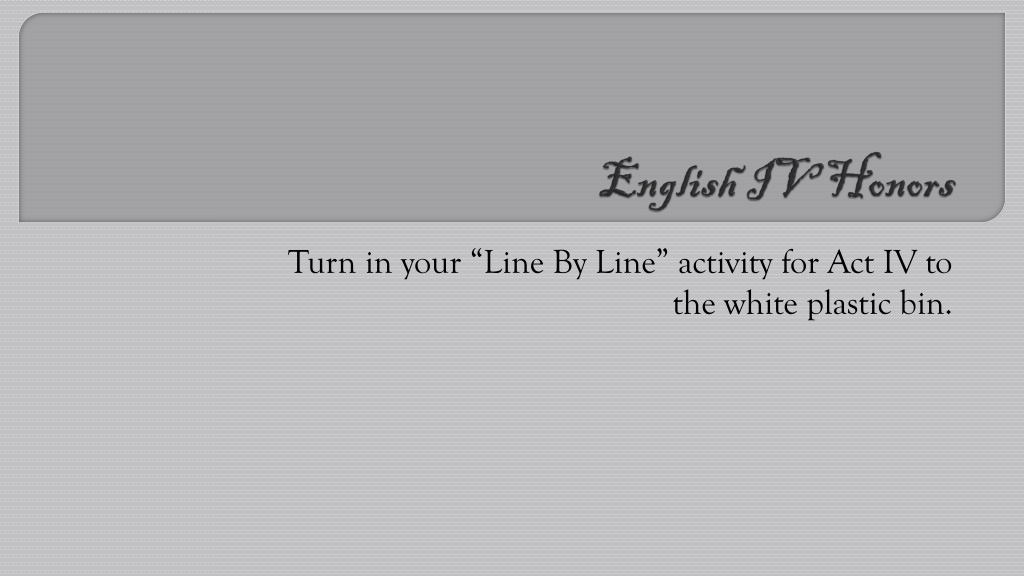
 undefined
undefined


